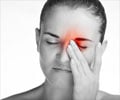Women who have a history of migraine headaches are at a significantly lower risk of breast cancer, a new study has found.
The findings have been reported in the November issue of Cancer Epidemiology, Biomarkers and Prevention by Christopher I. Li, M.D., Ph.D., and colleagues at Fred Hutchinson Cancer Research Center."We found that, overall, women who had a history of migraines had a 30 percent lower risk of breast cancer compared to women who did not have a history of such headaches," said Li, a breast-cancer epidemiologist and associate member of the Hutchinson Center's Public Health Sciences Division.
In particular, migraine history appeared to reduce the risk of the most common subtypes of breast cancer: those that are estrogen-receptor and/or progesterone-receptor positive.
Such tumors have estrogen and/or progesterone receptors, or docking sites, on the surface of their cells, which makes them more responsive to hormone-blocking drugs than tumors that lack such receptors.
The biological mechanism behind the association between migraines and breast cancer is not fully known, but Li and colleagues suspect that it has to do with fluctuations in levels of circulating hormones.
"Migraines seem to have a hormonal component in that they occur more frequently in women than in men, and some of their known triggers are associated with hormones," Li said.
Advertisement
Conversely, pregnancy - a high-estrogen state - is associated with a significant decrease in migraines.
Advertisement
Estrogen is known to stimulate the growth of hormonally sensitive breast cancer.
For the study, the researchers combined data from two population-based, case-control studies of 3,412 Seattle-area postmenopausal women, 1,938 of whom had been diagnosed with breast cancer and 1,474 of whom had no history of breast cancer, who served as a comparison group. Information on migraine history was based on self-report and was limited to migraines that had been diagnosed by a physician or other health professional.
Source-ANI
LIN














